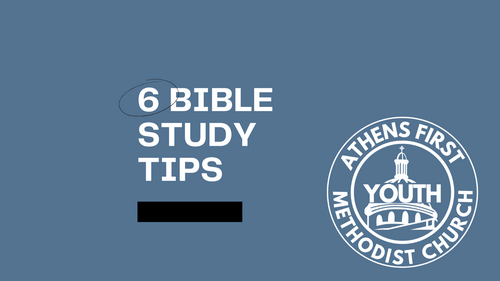
Bible Study Tips
1. Take Notes
Have a journal or notebook to take some notes as you read. Taking notes can help you remember things you are reading and also allow you to engage with the scripture. Some things to write out key verses that stand out to you, what questions you have about the passage, and how you live it out, and apply the scriptures to your life.
2. Set A Schedule
Our Gospels reading plan helps you with this because it tells you the readings for the day. You can pick a certain time each day to read and protect this time from other distractions. Let the time you pick be set apart, and then plan your day around that time. If you don't plan a time to read, you will more than likely not be consistent.
3. Get a bird’s-eye view
Who wrote the book?
To whom was it written?
When was it written?
In what literary style was it written?
What are the central themes of the book?
A good study Bible can provide these answers or an online resource like Bible Gateway. I also highly recommend the Bible Project’s “Explore” series, which gives overviews of books of the Bible.
4. Seek love, not knowledge.
It’s easy to read Scripture for the sake of knowledge or to check it off the list. But that’s the lesser option.
“Knowledge puffs up while love builds up” (1 Corinthians 8:1b, NIV).
Instead, look for the love in what you read because God is love. Don’t settle for knowing about him. We want to know him, and that level of knowing comes when God talks with us through what we read.
5. Choose A Version You Understand Of The Bible
Many new believers like to read the New International Version (NIV). The most accurate translations for in-depth study are considered to be the King James Version (KJV), the New King James Version (NKJV) or the English Standard Version (ESV).
There’s no harm reading other versions. In fact, I like to read the same passage in multiple versions to see what wording God may use to speak to me. I especially enjoy the modern wording of The Message (MSG), though I find it most helpful to read alongside other versions for word study. “The goal of The Message is to engage people in the reading process and help them understand what they read. This is not a study Bible, but rather ‘a reading Bible.’” Read more about The Message version here.
6.Explore!
Context - What’s happening in this scenario? Who is the audience? A particular Bible verse may speak to you, but what does that verse mean in the context of the whole passage?
Word meaning. What’s the meaning of the word in the source language?
The Old Testament was written in Hebrew and a few books in Aramaic, and the New Testament was written in Greek. Looking up words in the source language gives a depth of understanding you don’t get when just reading in English. For example, I may read “For God so loved the world” in John 3:16. My mind naturally thinks of “love” as affectionate or romantic, but that’s not what this verse means. In the original Greek, “love” here is agapao, which means goodwill, to be fond of. God’s love for us, which led him to give Jesus for our sins, wasn’t an emotional response. It was prompted by a love of goodwill. If you’re interested in doing word studies, I recommend the free website Blue Letter Bible. Pick the KJV and check the box for “Strong’s,” and you’ll see concordance links next to words. That way, you can easily see their meaning in the original language.
Connections -The next step in how to study the Bible involves looking for connections within the passage and to other passages. How does John 3:16 relate to the rest of the chapter? What other passages speak to the same topic?
For example:
“But God demonstrates his own love for us in this: While we were still sinners, Christ died for us” (Romans 5:8, NIV).
Application - How does this passage apply to your life? What is God saying to you through it?
1. Take Notes
Have a journal or notebook to take some notes as you read. Taking notes can help you remember things you are reading and also allow you to engage with the scripture. Some things to write out key verses that stand out to you, what questions you have about the passage, and how you live it out, and apply the scriptures to your life.
2. Set A Schedule
Our Gospels reading plan helps you with this because it tells you the readings for the day. You can pick a certain time each day to read and protect this time from other distractions. Let the time you pick be set apart, and then plan your day around that time. If you don't plan a time to read, you will more than likely not be consistent.
3. Get a bird’s-eye view
Who wrote the book?
To whom was it written?
When was it written?
In what literary style was it written?
What are the central themes of the book?
A good study Bible can provide these answers or an online resource like Bible Gateway. I also highly recommend the Bible Project’s “Explore” series, which gives overviews of books of the Bible.
4. Seek love, not knowledge.
It’s easy to read Scripture for the sake of knowledge or to check it off the list. But that’s the lesser option.
“Knowledge puffs up while love builds up” (1 Corinthians 8:1b, NIV).
Instead, look for the love in what you read because God is love. Don’t settle for knowing about him. We want to know him, and that level of knowing comes when God talks with us through what we read.
5. Choose A Version You Understand Of The Bible
Many new believers like to read the New International Version (NIV). The most accurate translations for in-depth study are considered to be the King James Version (KJV), the New King James Version (NKJV) or the English Standard Version (ESV).
There’s no harm reading other versions. In fact, I like to read the same passage in multiple versions to see what wording God may use to speak to me. I especially enjoy the modern wording of The Message (MSG), though I find it most helpful to read alongside other versions for word study. “The goal of The Message is to engage people in the reading process and help them understand what they read. This is not a study Bible, but rather ‘a reading Bible.’” Read more about The Message version here.
6.Explore!
Context - What’s happening in this scenario? Who is the audience? A particular Bible verse may speak to you, but what does that verse mean in the context of the whole passage?
Word meaning. What’s the meaning of the word in the source language?
The Old Testament was written in Hebrew and a few books in Aramaic, and the New Testament was written in Greek. Looking up words in the source language gives a depth of understanding you don’t get when just reading in English. For example, I may read “For God so loved the world” in John 3:16. My mind naturally thinks of “love” as affectionate or romantic, but that’s not what this verse means. In the original Greek, “love” here is agapao, which means goodwill, to be fond of. God’s love for us, which led him to give Jesus for our sins, wasn’t an emotional response. It was prompted by a love of goodwill. If you’re interested in doing word studies, I recommend the free website Blue Letter Bible. Pick the KJV and check the box for “Strong’s,” and you’ll see concordance links next to words. That way, you can easily see their meaning in the original language.
Connections -The next step in how to study the Bible involves looking for connections within the passage and to other passages. How does John 3:16 relate to the rest of the chapter? What other passages speak to the same topic?
For example:
“But God demonstrates his own love for us in this: While we were still sinners, Christ died for us” (Romans 5:8, NIV).
Application - How does this passage apply to your life? What is God saying to you through it?
Brandon Starnes
Recent
Archive
2025
September
October
2024
2023
March
